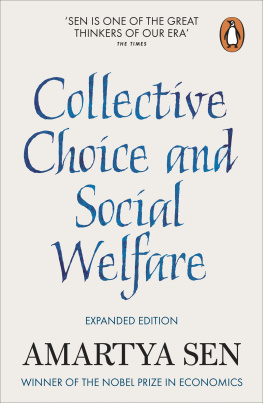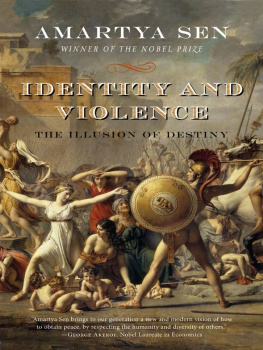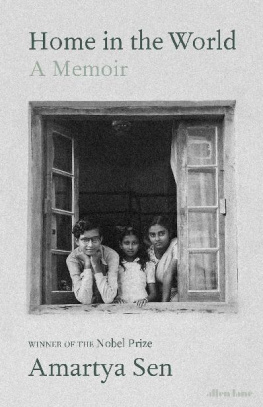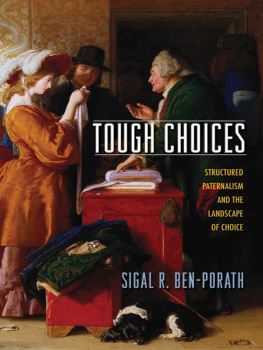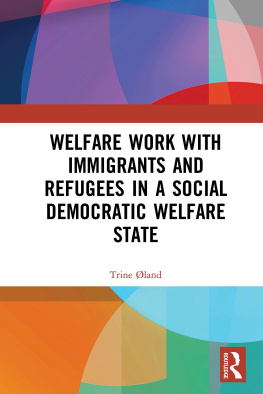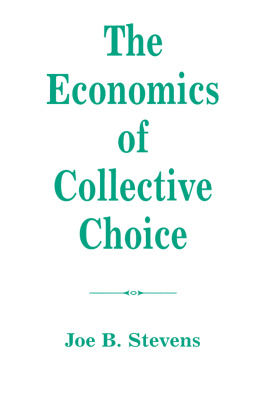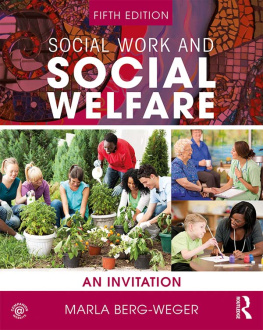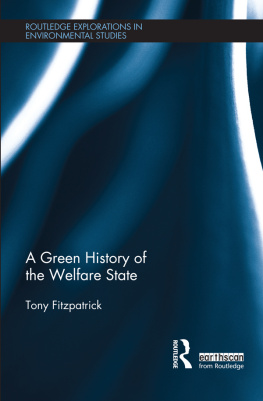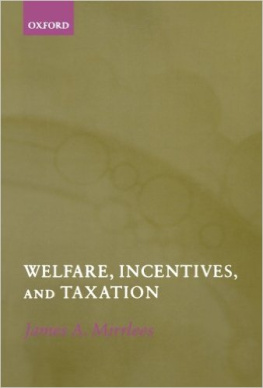Amartya Sen
COLLECTIVE CHOICE AND SOCIAL WELFARE
Expanded edition
ABOUT THE AUTHOR
Amartya Sen is Lamont University Professor, Professor of Economics and Professor of Philosophy at Harvard University. He won the Nobel Prize for Economics in 1998 and was Master of Trinity College, Cambridge, 19982004. His many celebrated books, which include Development as Freedom, The Argumentative Indian, The Idea of Justice and Identity and Violence, have been translated into more than thirty languages.
PENGUIN BOOKS
COLLECTIVE CHOICE AND SOCIAL WELFARE
With his masterly prose, ease of erudition and ironic humour, Sen is one of the few great world intellectuals on whom we may rely to make sense out of our existential confusion Nadine Gordimer
Amartya Sen occupies a unique position among modern economists. He is an outstanding economic theorist, a world authority on social choice and welfare economics. He is a leading figure in development economics, carrying out path-breaking work on appraising the effectiveness of investment in poor countries
Anthony B. Atkinson, New York Review of Books
The first edition in 1970 of this fine book was of immense importance and at the core of Amartya Sens Nobel Prize. His contributions since, to our conceptions of rights, liberty, justice, identity, poverty, inequality and development, have been of still greater significance to our understanding of the fundamental challenges we face as individuals and societies in thinking about who we are and how we should act. The substantive and profound additions in this edition delve even deeper into the arguments of the original and relate them to the central questions and issues of his subsequent research and writing. Sen is one of the great minds of both the twentieth and twenty-first centuries. We owe him a huge debt Nicholas Stern, I. G. Patel Professor of Economics and Government at the London School of Economics, President of the British Academy and crossbench member of the House of Lords
A full and most interesting discussion of the use of preferential intensities in social choice informed and balanced an elegant and organized account of a large, disorderly and technical literature
Michael Taylor, Economic Journal
Preface (1970)
The theory of collective choice belongs to several disciplines. Economics is one of them but not the only one. While this book is part of a series in mathematical economics texts, no attempt has been made to confine the treatment to economic problems exclusively. Indeed the approach of this book is based on the belief that the problem cannot be satisfactorily discussed within the confines of economics. While collective choice is a crucial aspect of economics (notably of welfare economics, planning theory and public economics), the subject relates closely to political science, in particular to the theory of the state and the theory of decision procedures. It also has important philosophical aspects, related to ethics and especially to the theory of justice.
The book is divided into starred chapters which contain formal analyses, and unstarred ones which are quite informal. They alternate. A non-technical reader can get an intuitive idea of the main arguments from the unstarred chapters. However, for precise statement of results as well as proofs, the starred chapters have to be read.
The partitioning of the book into formal and informal chapters is a stylistic experiment. Many problems of collective choice require a rigorous and formal treatment for definiteness, and informal arguments can indeed be treacherous, but, once the results are obtained, their meaning, significance and relevance can be discussed informally. In fact, a purely formal discussion of significance would be unnecessarily narrow. The book attempts to cater to two distinct groups of readers, viz., those who are primarily interested in the relevance of the results rather than in their formal statement and technical derivation, and those who are also concerned with the latter. Thus, the partitioning of the book into starred and unstarred chapters does have some rationale, aside from reflecting the authors incurable schizophrenia.
The mathematics used in the book mainly involves the logic of relations. The main results of mathematical logic employed in proving theorems on collective choice are stated, discussed and proved in . The book is in this sense self-contained.
The field of collective choice is vast. It has not been possible to cover all the branches, and still less to discuss all of them equally thoroughly. While it is hoped that the book covers the major branches of the literature adequately, it must be recognized that the judgment of the relative importance of different branches represents the authors own bias.
For facilities of typing and duplication of two versions of this manuscript I am grateful to the Delhi School of Economics and to the Harvard Institute of Economic Research. The actual typing of the two versions was done very efficiently by Mr C. G. Devarajan and Mrs. Helen Bigelow, respectively.
I must express my indebtedness to people who have influenced this book. My interest in the problem was first aroused by some stimulating discussions with Maurice Dobb when I was an undergraduate at Trinity College, Cambridge, about a decade and a half ago, and I have had discussions with him intermittently ever since. My debt to Kenneth Arrow is immense, not merely because his pioneering work has opened up several avenues of research in the field of collective choice, but, more personally, because he has gone through the entire manuscript and has suggested many important improvements. John Rawls read entirely the first version of the manuscript, which was prepared during 19667, and has put me right on several questions, especially on the philosophical side of the problem. During 19678, Tapas Majumdar, James Mirrlees and Prasanta Pattanaik read the first draft of the manuscript and suggested numerous improvements both of substance and style, and the final version of the book reflects the impact of their comments. I have also benefited from the joint seminar on this subject that Arrow, Rawls and I conducted at Harvard University during 19689, in particular from the participation of Franklin Fisher, A. Gibbard, Stephen Marglin, Howard Raiffa, Jerome Rothenberg, Ross Starr, David Starrett and Richard Zechhauser. I have also had useful discussions with, or helpful comments from, Dipak Banerjee, Robert Cassen, Partha Dasgupta, Peter Diamond, Jan Graaff, Frank Hahn, Bengt Hansson, John Harsanyi, Hans Herzberger, Ken-Ichi Inada, Tjalling Koopmans, Abba Lerner, Paul Samuelson, Thomas Schelling, and Subramaniam Swamy. But I am, alas, reconciled to the fact that none of these gentlemen can be held responsible for the errors and shortcomings of this work.
New Preface (2017)
Social Choice and this Book
A society consists of a group of people with a variety of preferences and priorities. To make fitting social decisions on behalf of the group as a whole, the society must take serious note of the peoples (possibly diverse) views and interests. Aggregate assessment is central to social choice theory, but to determine how such aggregate social decisions should be made is not an easy task. There can be, as Horace pointed out long ago, as many preferences as there are people. That is the task that social choice theory has to address.
Problems of social choice arise in many different ways, from electing national governments and holding referendums on public policies to facilitating peoples economic and social opportunities and safeguarding the rights and liberties of individuals and minorities. We also have to deal with global problems, including decisions about international trade and economic relations, cross-border peace and avoidance of terrorism, having reasonable arrangements for the movement of people, encouraging educational and cultural exchange, and, of course, preserving the worlds climatic health, which is so challenging right now. Our lives are surrounded by social choices of various kinds.

